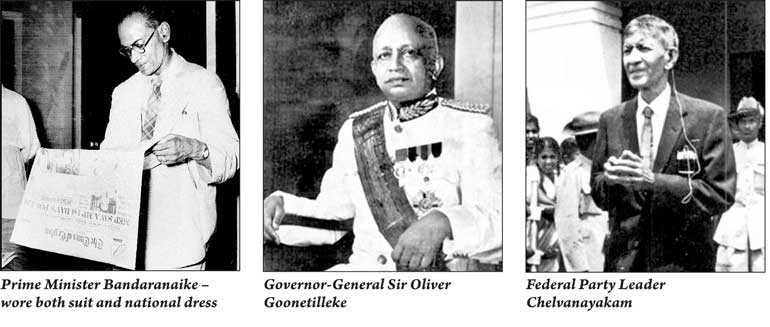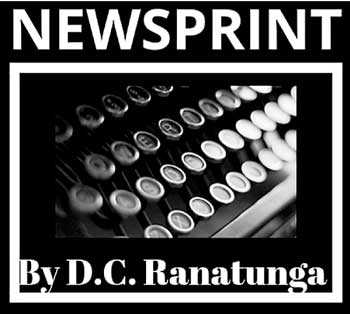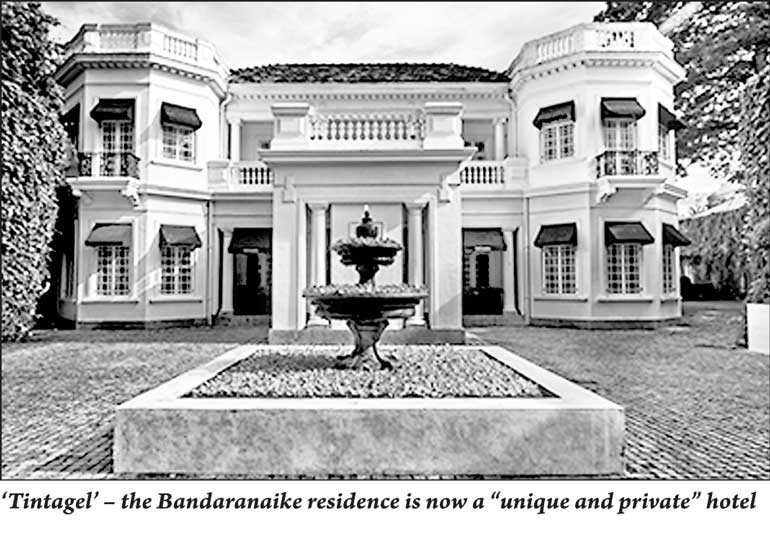Sunday Feb 22, 2026
Sunday Feb 22, 2026
Saturday, 16 February 2019 00:10 - - {{hitsCtrl.values.hits}}

 Prime Minister Bandaranaike met pressmen once a week in the morning at his residence in Rosmead Place. (He did not occupy Temple Trees, the official residence of the prime minister, using it only for official functions.) ‘Kiribath’ was served and he discussed the Government’s plans and answered questions. Most often he used to be clad in Western attire.
Prime Minister Bandaranaike met pressmen once a week in the morning at his residence in Rosmead Place. (He did not occupy Temple Trees, the official residence of the prime minister, using it only for official functions.) ‘Kiribath’ was served and he discussed the Government’s plans and answered questions. Most often he used to be clad in Western attire.
With the enactment of the Sinhala Only Act making Sinhala the official language in place of English, the Tamil community vehemently opposed to making Sinhala the official language in place of English and demanded that Tamil be given equal recognition as Sinhala. The Federal Party (FP) headed by lawyer S.J.V. Chelvanayakam QC (1898-1977) led the Tamil protest movement.
As the name indicates, it advocated a federal constitution. The FP had won 10 seats at the 1956 general election when the other Tamil party – the All-Ceylon Tamil Congress won just one seat. The FP was the second in the Opposition with the LSSP having 14 seats thereby LSSP Leader Dr. N.M. Perera becoming the Leader of the Opposition.
In trying to find a solution to the language issue Bandaranaike conducted negotiations with the FP. He agreed to make Tamil the official language for administrative purposes in the Northern & Eastern provinces and to establish a scheme of devolving administrative powers to regional councils. Sinhala extremists and some of the Buddhist clergy were up in arms and protested against what came to be known as the Bandaranaike-Chelvanayakam Pact (B-C Pact).
Riots in Colombo led to shops being burnt in the Pettah. We reporters were out on the streets. I remember rushing towards Main Street where around the Khan clock tower where there was pandemonium. The following morning the monks occupied the entrance to the Prime Minister’s Rosmead Place residence, demanding that the Pact be scrapped. I reported how the Prime Minister came up to them and announced he would withdraw it.
The riots continued in several parts of the country and the Prime Minister sought the assistance of the Governor-General Sir Oliver Goonetilleke to handle the situation. A state of emergency was declared and there was press censorship. Sir Oliver held a daily press conference to announce the progress of the situation.
It was rarely, if at all, we could go to Queen’s House. To go to where GG was resident, walk up to the GG’s office in the first floor and listen to him was an experience in itself. Always clad in a white suit, he would come in with a broad smile. His desk was full of telephones and during the meeting he used to receive several calls. I distinctly remember him saying ‘Shoot, shoot’ once in responding to a telephone call. Some of the pressmen felt it was a bogus call just to impress us!
The press conferences continued until the situation eased.
By now we had to work later than our usual eight-hour day from 10 in the morning till 6 in the evening. As I started I came to work from home – from Gampaha by train just as I used to do during my school days at Ananda. My mother prepared a rice and curry lunch served on a ‘kehel kole’ and it tasted great. Being two-and-a-half miles away from Gampaha, I cycled to town, parked the bicycle in a known place and jumped the train. I got back home around 8 in the evening. Realising it was not a convenient arrangement, particularly when Parliament sittings went on till late (sittings began at 2 p.m.), I decided to stay in a boarding house in Kollupitiya, going home on Friday evening and get back to work on Sunday.
